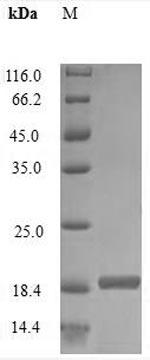Recombinant Rabbit Interleukin-2 (IL2) is expressed in E. coli and includes an N-terminal 6xHis tag that makes purification straightforward. The protein represents the complete mature form, covering amino acids 21 to 153. This product reaches purity levels above 90% when verified by SDS-PAGE, which appears to ensure consistent performance in research settings. It's designed strictly for research use and should not be considered for diagnostic or therapeutic applications.
Interleukin-2 (IL2) stands as a crucial cytokine within the immune system. Its primary function involves activating and promoting T cell proliferation. The protein plays what seems to be a significant role in regulating immune responses and acts as a key element in immune signaling pathways. Given IL2's central importance in immune research, it likely represents a valuable tool for studies focused on immune regulation and related therapeutic developments.
Potential Applications
Note: The applications listed below are based on what we know about this protein's biological functions, published research, and experience from experts in the field. However, we haven't fully tested all of these applications ourselves yet. We'd recommend running some preliminary tests first to make sure they work for your specific research goals.
Rabbit IL-2 is a cytokine that typically requires proper disulfide bond formation and tertiary structure for bioactivity (e.g., T-cell proliferation). While E. coli can successfully express some cytokines, the correct folding of IL-2 is not guaranteed without validation. No refolding procedure or activity validation data are provided. Therefore, while correctly folded IL-2 from E. coli is possible with proper protocols, the protein's folding status and bioactivity cannot be confirmed from the given information alone. Applications should be considered conditional until functional validation is performed.
1. Rabbit-Specific Immunological Research
IL-2 bioactivity depends on proper folding for receptor binding; inactive protein would invalidate T-cell proliferation experiments. If the recombinant rabbit IL-2 is correctly folded and bioactive, it can serve as a species-matched cytokine for examining T-cell proliferation and activation in rabbit-derived cell cultures. The protein would provide a standardized reagent for immune response studies. However, if the protein is misfolded or inactive, it will not elicit proper biological responses and could lead to false negative results in functional assays.
2. Comparative Cytokine Biology Studies
Comparative studies require functional proteins; structural defects would distort species-specific comparisons. If properly folded and functional, this rabbit IL-2 enables valid comparative analysis with IL-2 orthologs from other species for studying evolutionary conservation and species-specific differences. If misfolded, any comparative data on receptor binding affinity or signaling would be unreliable and misleading.
3. Anti-IL-2 Antibody Development and Validation
Antibody development can proceed with linear epitopes, but conformational specificity requires proper folding.
The recombinant protein can be used as an immunogen for antibody generation regardless of folding status, as antibodies may recognize linear epitopes. However, if correctly folded, antibodies will likely recognize conformational epitopes relevant to native IL-2 function. If misfolded, generated antibodies might not bind the natural protein effectively.
4. Protein-Protein Interaction Studies
Protein interactions depend on native conformation; misfolding compromises interaction mapping. If the IL-2 is properly folded, the His-tag enables valid pull-down assays to identify receptor components and signaling partners from rabbit cell lysates. If misfolded, interaction domains may be altered, leading to false positive/negative results in binding studies.
5. Cell Culture Supplementation for Rabbit Cell Lines
Cell culture supplementation requires functional cytokine activity; inactive protein would be ineffective. If bioactive, this recombinant protein provides an excellent, defined source of IL-2 for maintaining rabbit T-cell cultures. If inactive, it will fail to support cell growth and may compromise long-term culture viability.
Final Recommendation & Action Plan
Before employing this recombinant rabbit IL-2 in any application, it is essential to validate its bioactivity through a T-cell proliferation assay or similar functional test. If active, proceed with applications while including appropriate controls, but if inactive, consider obtaining a commercially validated IL-2 or expressing the protein with a system that ensures proper disulfide bond formation, and always include positive controls in experiments to confirm cytokine functionality.






